The Bank of the Central African States (BEAC) is a regional central bank for the monetary and customs union formed by Cameroun, Central African Republic, Chad, Congo (Brazzaville), Gabon, and (since 1985) Equatorial Guinea. It succeeded the Equatorial African States Bank in 1972-73 when the latter was reorganized and renamed to provide greater African control over its operations. The seat of the BEAC was transferred from Paris to Yaounde in 1977 and an African governor assumed responsibility for direction of the bank in 1978.
The BEAC is a member of the franc zone with its currency denominated in CFA francs and pegged to the French franc at a rate of 50-1. BEAC notes carry country names on the face and the central bank name on the back. The 1974-84 series had common back designs but were face-different. A new series begun in 1983-85 uses common designs also on the face except for some 1,000 franc notes. The notes carry the signatures of LE GOUVERNEUR (LE DIRECTEUR GENERAL prior to 01-04-1978) and UN CENSEUR (since1972). Cameroun, Gabon, and France each appoint one censeur and one alternate. Cameroon and Congo notes carry the Cameroun censeur signature. Central African Republic, Equatorial Guinea, and Gabon notes carry the Gabon censeur signature. Chad notes have been divided between the two. Prior to 1978, all BEAC notes were printed by the Bank of France. Since 1978, the 500 and 1000 franc notes have been printed by the private French firm F.C. Oberthur. The Bank of France notes are engraved and usually undated. The F.C. Oberthur notes are lithographed and most carry dates. See individual member countries
for additional note listings. Also see Equatorial African States and French Equatorial Africa.
Note: The first two digits of the serial number for the 1993-2002 series indicate the date of issue.
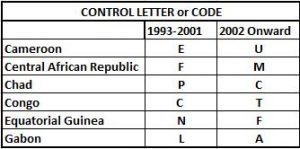
Showing all 22 results
-
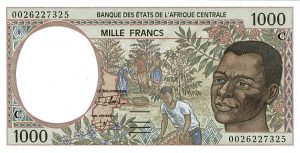
Central African States P-102Cg / 1,000 Francs 2000 – UNC (Congo)
£9.00 Add to cart -
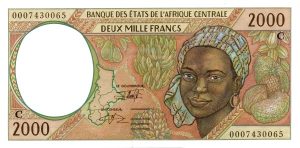
Central African States P-103Cg / 2,000 Francs 2000 – UNC (Congo)
£13.50 Add to cart -
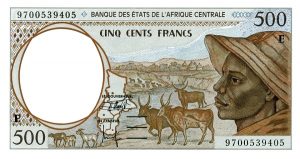
Central African States P-201Ed / 500 Francs 1997 – UNC (Cameroon)
£9.00 Add to cart -
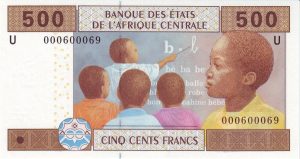
Central African States P-206U / 500 Francs 2002 – UNC (Cameroon)
£6.70 Add to cart -

Central African States P-207U / 1,000 Francs 2002 – UNC (Cameroon)
£10.00 Add to cart -
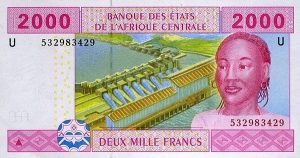
Central African States P-208U / 2,000 Francs 2002 – UNC (Cameroon)
£19.00 Add to cart -
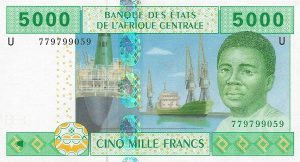
Central African States P-209Ue / 5,000 Francs 2002 – UNC (Cameroon)
£31.00 Add to cart -
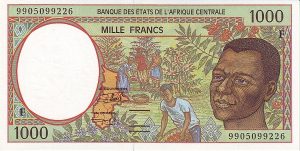
Central African States P-302Ff / 1,000 Francs 1999 – UNC (Central African Republic)
£9.00 Add to cart -
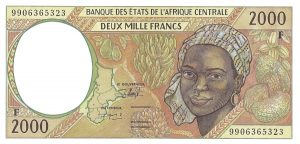
Central African States P-303Ff / 2,000 Francs 1999 – UNC (Central African Republic)
£11.50 Add to cart -
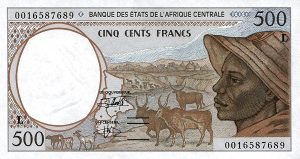
Central African States P-401Lg / 500 Francs 2000 – UNC (Gabon)
£7.70 Add to cart -
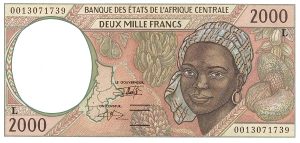
Central African States P-403Lg / 2,000 Francs 2000 – aUNC (Gabon)
£13.70 Add to cart -
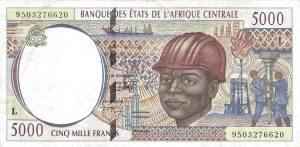
Central African States P-404Lb / 5,000 Francs 1995 – UNC (Gabon)
£27.00 Add to cart -
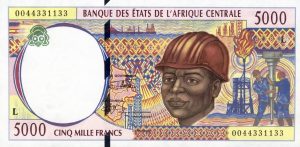
Central African States P-404Lf / 5,000 Francs 2000 – UNC (Gabon)
£31.00 Add to cart -
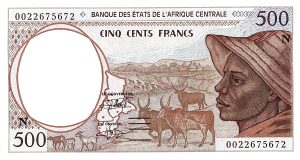
Central African States P-501Ng / 500 Francs 2000 – UNC (Equatorial Guinea)
£8.70 Add to cart -
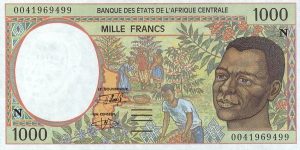
Central African States P-502Ng / 1,000 Francs 2000 – UNC (Equatorial Guinea)
£9.00 Add to cart -
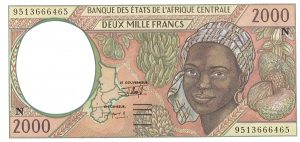
Central African States P-503Nc / 2,000 Francs 1995 – UNC (Equatorial Guinea)
£18.50 Add to cart -
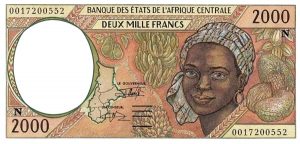
Central African States P-503Ng / 2,000 Francs 2000 – aUNC (Equatorial Guinea)
£13.50 Add to cart -
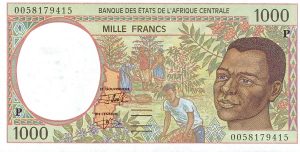
Central African States P-602Pg / 1,000 Francs 2000 – UNC (Chad)
£10.00 Add to cart -
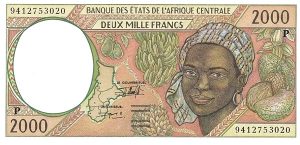
Central African States P-603Pb / 2,000 Francs 1994 – UNC (Chad)
£19.70 Add to cart -
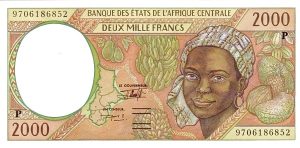
Central African States P-603Pd / 2,000 Francs 1997 – UNC (Chad)
£17.50 Add to cart -

Central African States P-603Pg / 2,000 Francs 2000 – aUNC (Chad)
£14.00 Add to cart -
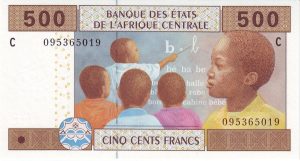
Central African States P-606Ca / 500 Francs 2002 – UNC (Chad)
£7.70 Add to cart